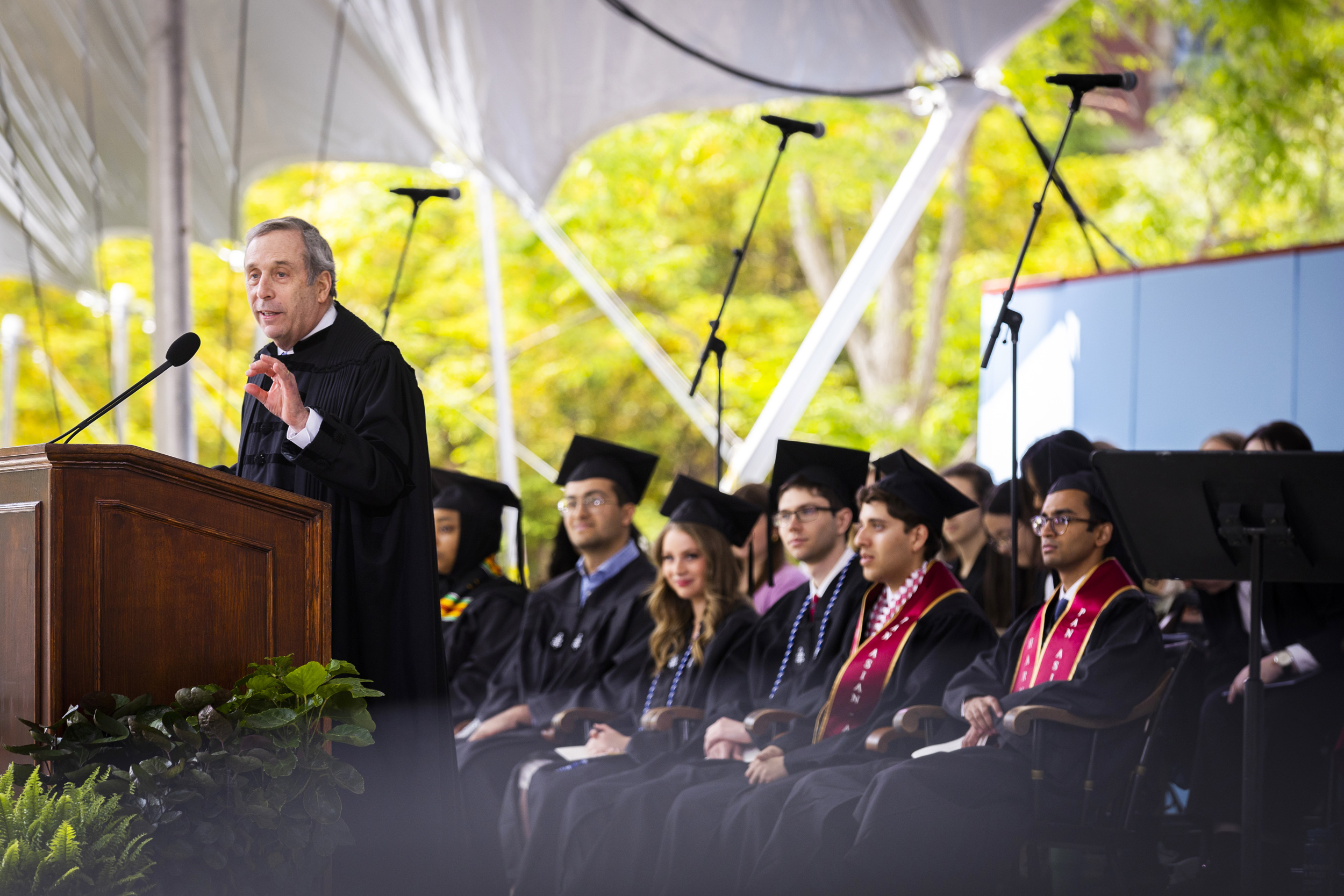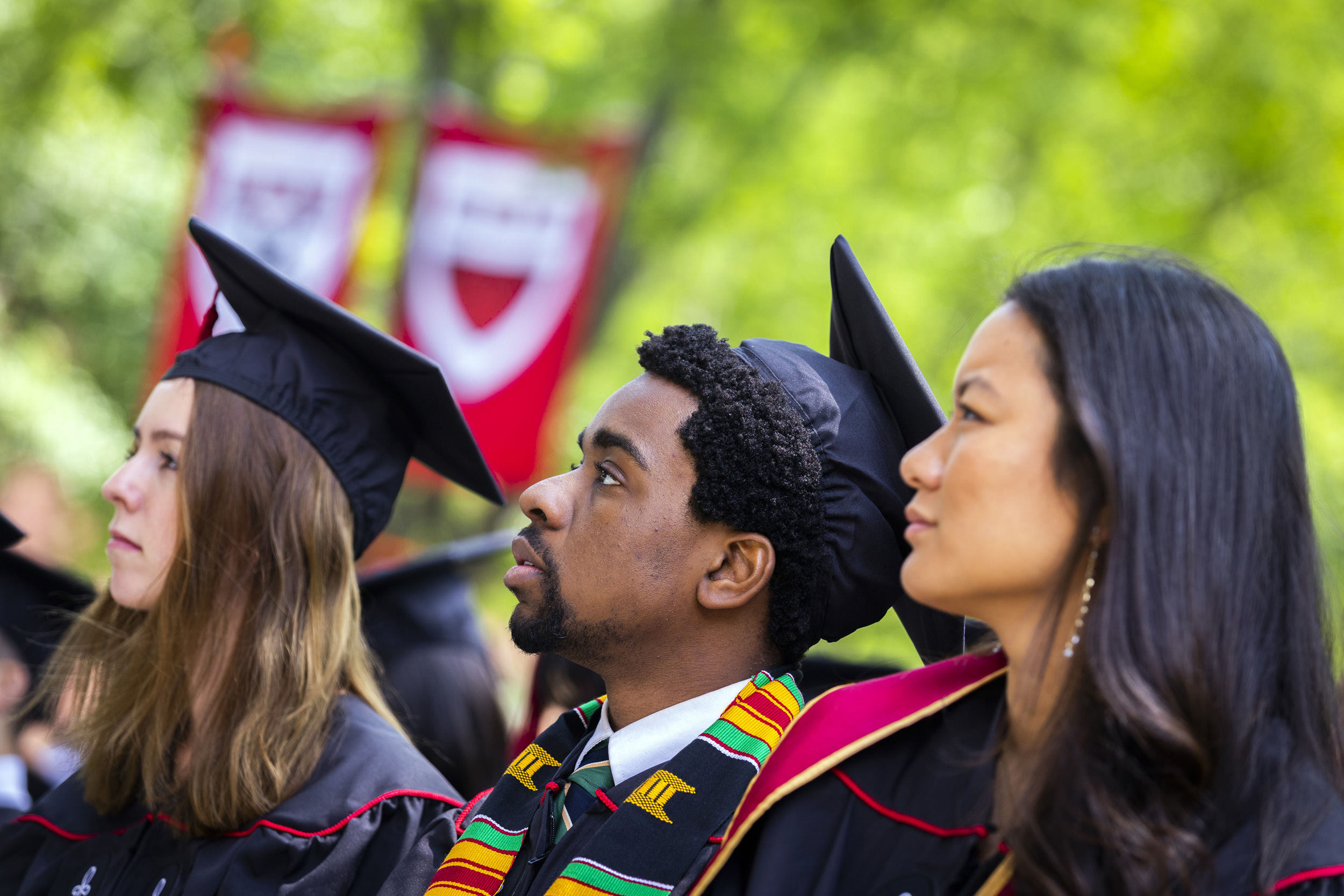
President Larry Bacow addresses the Class of 2023, drawing on memories of his arrival at Harvard as a graduate student more than 50 years ago.
Photos by Stephanie Mitchell/Harvard Staff Photographer
Praise for students who faced an extraordinary test — and passed
President Bacow addresses pandemic-era class: ‘Looking at you, I see the future as it might one day be, and it gives me hope.’
President Larry Bacow saluted the strength and mettle of the Class of 2023, whose years at the College were marked by the far-reaching disruption of the pandemic, in his final Baccalaureate address Tuesday at Tercentenary Theatre.
“The last four years tested my most basic assumptions about our mission and our community — how both are sustained and strengthened in the face of incredible upheaval,” Bacow, who will step down next month after five years leading the University, told graduates. “Every stepping stone I assumed would be there was swept away. Every predetermined outcome I took for granted was reconsidered. And, in turmoil, I rediscovered the point of this place — and how very much it is the people who define the University — our students, faculty, and staff.
“I hope that no other Harvard College class will ever have to experience what you did. But I also believe — and I know — that you are among the strongest classes in Harvard history because you faced so many unexpected challenges. And you held it together through it all.”
The Baccalaureate ceremony dates to Harvard’s first Commencement, in 1642. Since the 19th century, it has included an address by the University president to the graduating class. Tuesday’s service was conducted by the Rev. Matthew Ichihashi Potts, Plummer Professor of Christian Morals and Pusey Minister in the Memorial Church.
Bacow’s remarks drew on memories of the day he arrived at Harvard as a graduate student more than 50 years ago. He also encouraged students to “resist the urge to have life all figured out,” and to remember that learning is a lifetime endeavor. “Commencement is the beginning of the rest of your education,” he said.

Reflecting on how the coronavirus upended life at the University and around the world, Bacow shared some lessons he learned in the early months of the crisis.
“During the pandemic, I learned that I needed the advice and counsel of those who knew far more about the complexities of decisions that, let’s face it, were completely foreign to me,” he said. “I knew nothing about infectious diseases. I knew nothing about epidemiology, virology, or public health. Had I made important decisions without the benefit of counsel from those who are experts in these fields, I would have been guilty of presidential malpractice.
“I hope you leave Harvard with the humility to know that you can never know everything. I urge you to avail yourself of all the intelligent people at your disposal. As the Talmud reminds us, the wise person learns from all people.”
As he neared the end of his speech, Bacow thanked his audience of students, whose “unmatched vigor” opened his mind to new ideas. “You are alive with possibility and promise,” he said. “Looking at you, I see the future as it might one day be, and it gives me hope.”
In his final piece of advice, Bacow borrowed from his own life to warn students against self-doubt.
“A little more than five years ago, I was, very happily, a semi-retired university president enjoying my freedom, my life, my privacy, and the ability to do things spontaneously, ” he said. “Someone suggested I consider this job. I literally looked in the mirror — and what did I see? I did not see the president of Harvard.”
The future president overcame his concerns after his wife, Adele, convinced him that he’d do fine by just being himself. It was wise counsel.
“When she said that, I stopped looking in the mirror, I got out of my own way, and here I am, standing in front of you — giving you the last advice I will ever give to a Harvard College class.”




